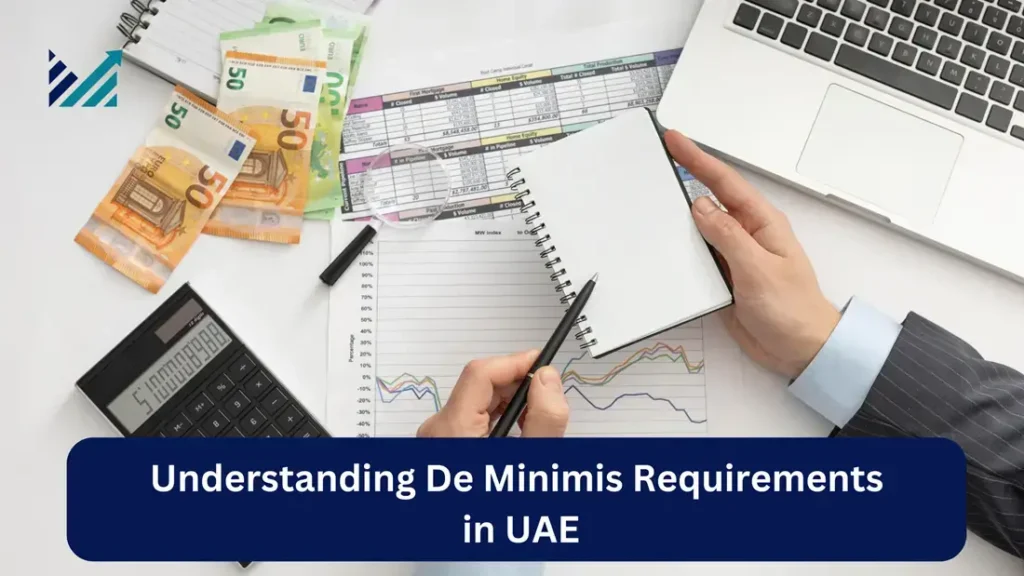
In the United Arab Emirates (UAE), Free Zone Persons (FZPs) can benefit from a 0% Corporate Tax rate on their Qualifying Income, provided they meet specific conditions, including the de minimis requirements. These requirements allow FZPs to earn a limited amount of non-qualifying income without losing their preferential tax status.
How Audit Firms in the UAE Can Help
Handling the de minimis requirements and ensuring compliance with the 0% Corporate Tax rate can be complex for Free Zone Persons (FZPs). Audit firms in the UAE can assist by conducting tax assessments, verifying qualifying income, and ensuring that non-qualifying income remains within permitted thresholds. Their expertise helps businesses maintain their preferential tax status while avoiding penalties and compliance risks. Consulting a professional audit firm in UAE ensures that your corporate tax strategy aligns with the latest FTA regulations and tax laws.
What Are the De Minimis Requirements?
The de minimis requirements are met when an FZP’s non-qualifying revenue does not exceed the lower of:
- AED 5,000,000
- 5% of the total revenue for the tax period
Non-qualifying revenue includes income from:
- Excluded Activities
- Activities that are not Qualifying Activities, especially when the counterparty is a non-Free Zone Person
Certain revenues are excluded from both non-qualifying revenue and total revenue calculations, such as:
- Revenue related to immovable property located in a Free Zone from transactions with non-Free Zone Persons concerning commercial property
- Revenue from transactions involving immovable properties (that are not commercial properties) located in Free Zones with any other persons
How to Calculate the De Minimis Threshold
To determine compliance with the de minimis requirements, an FZP should follow these steps:
- Calculate Total Revenue – Sum all income sources for the tax period.
- Identify Non-Qualifying Revenue – Determine income from Excluded Activities and non-qualifying activities with non-Free Zone Persons.
- Apply the Threshold – Ensure non-qualifying revenue does not exceed the lesser of AED 5,000,000 or 5% of total revenue.
What Happens If You Exceed the De Minimis Threshold?
If an FZP’s non-qualifying revenue surpasses the de minimis threshold, the entity risks losing its Qualifying Free Zone Person status.
This means the FZP would be subject to the standard Corporate Tax rate of 9% on all taxable income, instead of benefiting from the 0% rate on qualifying income.
Example Calculation
Consider a Free Zone company with the following revenue breakdown:
- AED 8,000,000 from transactions with other Free Zone companies
- AED 1,500,000 from transactions with non-Free Zone companies involving Qualifying Activities
- AED 300,000 from Excluded Activities within the Free Zone
Step 1: Calculate Total Revenue
Total revenue = AED 9,800,000
Step 2: Identify Non-Qualifying Revenue
Non-qualifying revenue = AED 300,000
Step 3: Apply the De Minimis Threshold
- 5% of total revenue = 5% of AED 9,800,000 = AED 490,000
- The lower of AED 5,000,000 or AED 490,000 is AED 490,000
Since AED 300,000 (non-qualifying revenue) is less than AED 490,000, the company meets the de minimis requirements and can continue to enjoy the 0% Corporate Tax rate on its Qualifying Income.
Conclusion
Maintaining compliance with the de minimis requirements is crucial for FZPs to retain the 0% Corporate Tax rate on their Qualifying Income.
To avoid any tax liabilities, FZPs should regularly monitor their revenue sources and classify income correctly to ensure they do not exceed the set limits.
Frequently Asked Questions (FAQs) on De Minimis Requirements in UAE
1. What is the de minimis rule in UAE?
The de minimis rule in the UAE is a regulation under the Corporate Tax framework that allows Free Zone Persons (FZPs) to earn a limited amount of non-qualifying income without losing their 0% Corporate Tax rate on qualifying income. The rule ensures that an FZP’s non-qualifying revenue does not exceed AED 5,000,000 or 5% of total revenue, whichever is lower.
2. What is de minimis regulation?
De minimis regulation refers to laws that set a threshold below which certain rules or penalties do not apply. In the UAE’s Corporate Tax system, the de minimis regulation allows Free Zone businesses to maintain their preferential tax status if their non-qualifying income remains within the specified limits.
3. What is the de minimis value?
The de minimis value is the threshold limit below which certain regulations or tax rules are not enforced. In the UAE, the de minimis value for non-qualifying revenue under the Free Zone tax regime is the lower of AED 5,000,000 or 5% of total revenue.
4. What is the de minimis limit?
The de minimis limit in the UAE’s Corporate Tax system for Free Zone Persons is AED 5,000,000 or 5% of total revenue, whichever is lower. If an FZP’s non-qualifying income exceeds this limit, it may lose its eligibility for the 0% Corporate Tax rate on qualifying income.
5. What are de minimis requirements?
The de minimis requirements ensure that a Free Zone Person can continue to benefit from the 0% Corporate Tax rate if their non-qualifying revenue remains within the prescribed limit. These requirements prevent businesses from earning excessive non-qualifying income while still claiming Free Zone tax benefits.
6. What is the new de minimis rule?
The new de minimis rule introduced under the UAE Corporate Tax framework states that Free Zone Persons must ensure their non-qualifying revenue does not exceed AED 5,000,000 or 5% of total revenue, whichever is lower. If this limit is exceeded, the FZP will be taxed at the standard 9% Corporate Tax rate on all income.

